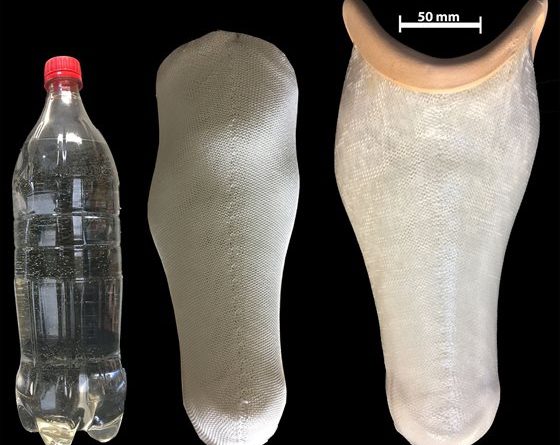Researchers turn bottles into prosthetic limbs
An expert at De Montfort University Leicester (DMU), UK, has successfully manufactured the first-of-its-kind prosthetic limb socket made from recycled bottles.
Dr Karthikeyan Kandan, senior lecturer in Mechanical Engineering at DMU, found he could grind the bottles down and use the granulated material to spin polyester yarns, which can then be heated up to form a solid yet lightweight material that can be moulded into prosthetic limbs. The cost of producing a prosthetic socket this way is just £10, compared to the current industry average of around £5,000 each.
Dr Kandan, who is also associate director of the Institute of Engineering Sciences at DMU, said this breakthrough could address the gap between high-performance prosthesis that cost thousands of pounds and affordable prostheses that lack quality and durability – as well as helping to solve the problem of plastic pollution. “Upcycling of recycled plastics and offering affordable prosthesis are two major global issues that we need to tackle,” he said. “We wanted to develop a prosthetic limb that was cost effective yet comfortable and durable for amputee patients.”
he project was funded by the Global Challenges Research Funding (GCRF), which supports cutting edge research to address challenges faced by developing countries. It was also backed by the Academy of Medical Sciences, the independent UK body that represents the diversity of medical science.
“There are so many people in developing countries who would really benefit from quality artificial limbs but unfortunately cannot afford them,” said Dr Kandan. “The aim of this project was to identify cheaper materials that we could use to help these people, and that’s what we have done.”
Dr Kandan worked with the Bhagwan Mahaveer Viklang Sahavata Samiti (BMVSS) in Jaipur, India – the world’s largest organisation for rehabilitating disabled people – as well as prosthetic experts from the Malaviya National Institute of Technology (also in Jaipur), and the British Universities of Salford, Southampton and Strathclyde.
“We manufactured the socket at DMU and then travelled to India to trial it with two patients – one who had his leg amputated above the knee, and one who had his leg amputated below the knee,” explained Dr Kandan. He is now looking to conduct a larger-scale study with more people from different countries, so that his design can be adapted to meet patients’ individual circumstances.

